Features of jigsaw repair

There is a wide variety of power tools from different manufacturers on the trading floors. There are a wide variety of models: both amateur cheap and "sophisticated" professional, which cost a lot of money.

Jigsaws occupy a special place, they are also in great demand. There are units of various sizes from domestic manufacturers and imported ones.

Device
The jigsaw is a tool which is suitable for working with a wide variety of materials:
- solid wood;
- Chipboard;
- plywood;
- hardboard;
- soft metal;
- PVC materials.




The versatility of this wonderful tool allows you to perform complex complex work that another tool is not able to do. Saw blades are actively involved during operation, they are subjected to considerable mechanical stress, and fail after a certain period of time.

The jigsaw mechanism is also under heavy stress. If such a unit is used regularly, then you should know its layout, how it works.
The principle of this unit is simple, its main blocks are:
- engine;
- reducer;
- stock.

Air cooler, speed control, swinging assembly are all auxiliary holding elements that ensure the duration and productivity of the work.

In some models, the electric jigsaw is provided with a separate start button, which can also adjust the frequency of the torque.

From the point of view of the transformation of electrical energy, the following process occurs:
- an electrical impulse entering the tool goes to the brushes (they are made of graphite), which ensures the appearance of a torque on the rotor;
- the impulse of rotation is transmitted to the gearbox - a unit that transforms the torque into a translational motion, which is directed to the stem.

In this scheme, a special role is assigned to the fastening unit, which ensures a reliable connection of the stem to the moving blade.

As you can see, the principle of the jigsaw is the same for all models. The difference is present only in the quality of assembly, fitting of units, materials.
Knowing the "general outline" and the operation algorithm of the elements, it is easy to understand what breakdowns and malfunctions may occur, as well as to find out the reasons due to which they arise.

Frequent malfunctions
Like any mechanism, a jigsaw may experience various malfunctions:
- the tool cuts crookedly, the blade “leads” to the side at an angle that is unacceptable;
- the fastening of the cutting tool has broken, the file flies out;

- the unit does not turn on;
- the gear wheel or its teeth breaks down;
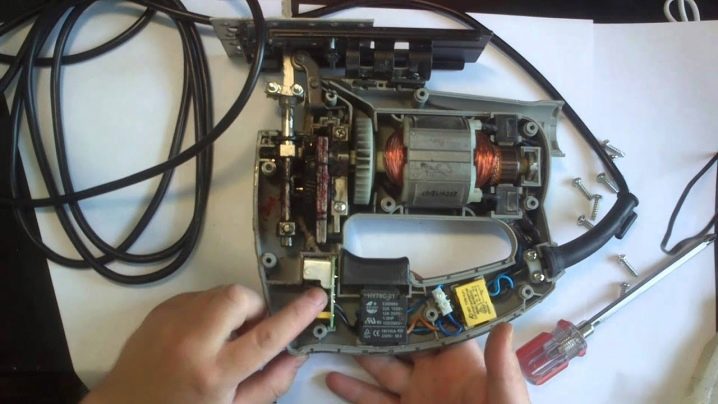
- the worm gear, which is anchored, wears out;
- the blade jumps or falls out when sawing;
- the clamp does not work, the file does not hold;

- the teeth on the collet are crumbling.
The nature of the jigsaw's work is cutting out curves of cuts. The curvature can be different, so there are also some indicators here. A large load during such work falls on the main support roller, which often becomes unusable. So that it does not go out of order ahead of time, it is recommended to observe all operating modes.
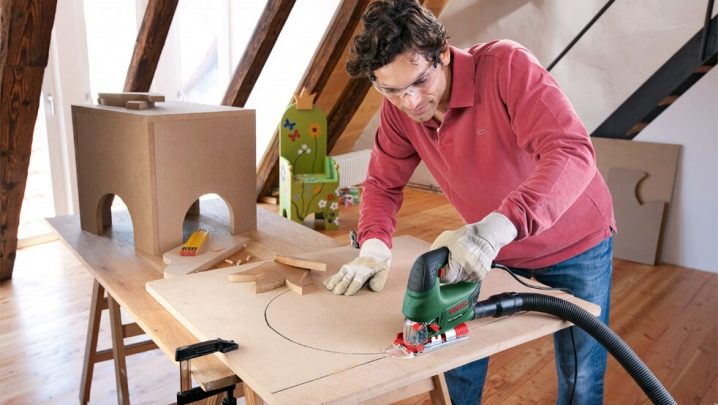
Mechanisms often fail when mechanical microparticles hit the dynamic elements. It is imperative to carry out timely preventive inspection and cleaning of the internal components of the device.It is necessary to flush the unit with a special WD-40 compound. It is also useful to use a vacuum cleaner to clean the power tool: the reason for the breakdown of the gearbox can be if dust gets on it.

Stem breakage most often occurs during mechanical damage.

Breaking a tooth on the collet also happens most often due to the fault of the master. This happens if the working blade is fastened too tightly.
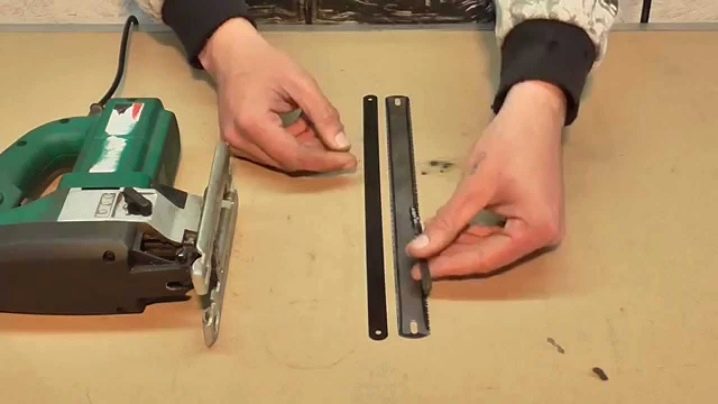
The worm gear cannot withstand the loads if the tool is “driven” with the afterburner.

It is recommended to start work after a short warm-up of the engine at idle speed.
If you do not follow the recommendations, then such malfunctions occur:
- the bearing wears out quickly;
- the cam block is erased;
- the gear becomes unusable.

Also, a fairly frequent breakdown is the abrasion of brushes, which are easy to replace. Preventive cleaning of running units is a must. Lubrication should also be done regularly.

Another common malfunction is the breakage of the holder, which causes the blade to fall out.
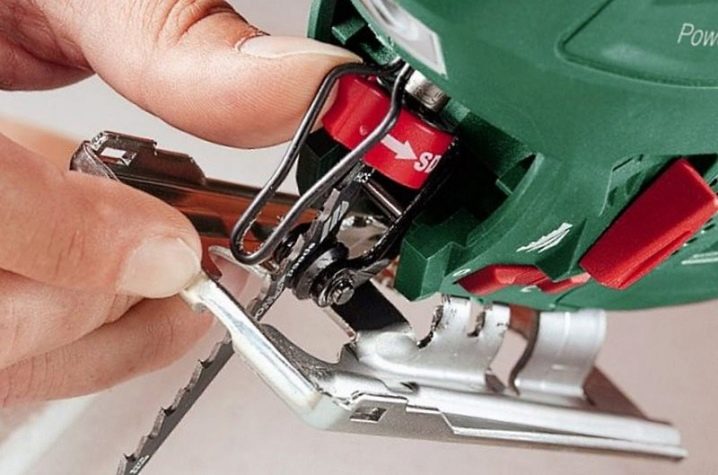
Often, the attachment of the jigsaw loses its rigidity, as a result of which backlash appears, which affects the quality of work. Clamps are almost impossible to repair - they have to be changed.
Some unscrupulous manufacturers make bolts from fragile materials. Such cheap alloys break at the slightest load and are extremely short-lived - you have to change the "native" bolts for fasteners made of strong steel.

The more complex the design, the more often breakdowns are possible. Modern gadgets, which manufacturers "stuff" the tool with, do a disservice. They are often the cause of electrical breakdowns.

For example, the standard web feeding function (available on almost all models) greatly helps the job by reducing stress on the worker's hands. However, the presence of such a mechanism leads to a great deal of wear and tear of individual units of the unit, such as:
- guide roller;
- bushings (especially in the stock).
Another example can be cited when too much load appears, which can be caused by the physical impact of an inexperienced worker: if the model is not too expensive, then, as a rule, the file in it can break the fragile holder.

The platter roller may suddenly “freeze”. The reasons may be as follows:
- lack of lubrication;
- bearing breakage.
To change the roller, you need to dismantle the microsaw, separate the body by unscrewing the bolts. Pull the roller out of the niche and put the "fresh" one. You can do this operation yourself - it is simple.

If the protection is triggered, which protects the unit from overheating, then there may be several reasons, for example, the air duct is clogged with dust, which does not allow the engine to fully cool. You should take a brush or an old toothbrush and clean the sections of the grill. You can also use the following "tools" for cleaning:
- a needle;
- cotton rag;
- alcohol.
Thermal protection is available to protect the motor from overheating. It can be triggered due to contamination of the air intake grilles with dust and sawdust. Clean the grates, let the jigsaw cool down a little. After a while, the thermal switch will turn on automatically.

The cord may be damaged and the engine will not run. You can check the cord with a tester. If there is a defect, the readings on the device will be equal to infinity. The cord is inexpensive, it will need to be changed.

There are models that operate on portable chargers. When working with such jigsaws, the battery must not be discharged by more than 15–20%.

If this happens regularly, the battery will lose its resource, which will significantly reduce its life.
Repair
Before repairing the instrument yourself, it is recommended that you collect information paying attention to some of the phenomena that arise in the event of malfunctions:
- the case gets very hot;
- there are extraneous noises at the very beginning of the operation of the unit;
- sheaves of sparks appear when the jigsaw starts functioning.

There are two types of breakdowns that you can fix yourself:
- the electrical unit fails;
- mechanical elements break.
If the rotor or stator breaks down, then such a malfunction cannot be eliminated by yourself - the easiest way is to return the machine to a service center. This usually happens from excessive contamination of the working units and the lack of preventive cleaning of the unit.

If the brushes are worn out, you can replace them yourself - there is no difficulty here.
If the regulator, which is responsible for the speed, breaks down, then only a specialist can repair this unit. The tool can be disassembled in a matter of minutes. The case can be "halved" by unscrewing the screws. Old grease should be removed first, and new grease should be applied after cleaning.

Stem bushings are not for sale in stores, you can only find such elements only among used tools. The bushings are almost identical in different models.

The easiest to repair are devices where there is a rounded stem exit. The bushing is either selected, or the cone-shaped cavity is enlarged by tapering. Such procedures remove backlash if it occurs in the mount.
For individual models, special clips should be made; for their installation, copper foil is used (as a gasket). If the model has a budget, the stem is usually made of a metal plate. Manufacturers save on metal, so the thickness parameters of this plate are extremely insignificant. The plate often does not withstand loads and breaks.
In this case, the machine is disassembled, each stage is recorded, photographed with a digital camera. The part is removed (the plate has a complex configuration). The plate fragments are taken by the owner to select the correct replacement part on site. After installing a new part in place of the broken one, be sure to renew the lubricant.
It doesn't take much skill to change brushes. It is enough to open the body of the jigsaw and remove the worn-out brushes, gently wipe all the cavities and units of the unit with a piece of bandage. Then new brushes should be installed in place of the old elements. It is best to use rubbing alcohol for wiping.

The advantage of modern models is that there is no need to use a soldering iron. The thermal fuse also fails, but not as often. This part is easy to replace. If sparking is observed in the unit, then this primarily indicates that the brushes are worn out or the lubricant is out of date.
Any tool requires a preventive examination - this is a prerequisite for it to serve for a long time. In this case, additional revision or material expenditures for putting it in order will not be required.

After the end of the working cycle, the power tool is de-energized - this rule is not recommended to be forgotten. For some jigsaws, the socket has an additional fuse, which may fail - this should also be remembered.
Start button
The button, which is responsible for starting the operation and changing the operating modes on the jigsaw, plays an important role. If it breaks, then this element can only be found in specialized repair shops or online stores. It is not difficult to replace such a unit - it is enough to free it from the wire by unscrewing the bolts holding the terminal blocks. Modern designs are made in such a way that there is no need to use a soldering iron.
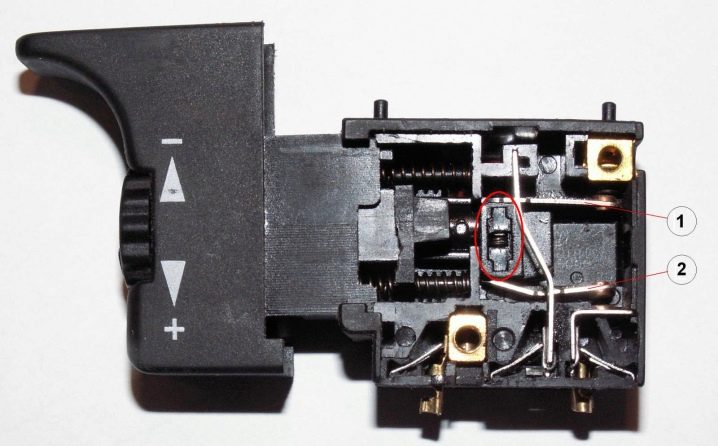
Replacing the file holder
In jigsaws, the most common malfunction is replacing the quick-detachable saw blade mount. For fastening, a tool of a certain thickness is required. If its size is smaller, then the file will "play".
There is an entrance from this situation: you can put the holder on bolts.Then the equipment will become quite versatile. To do this, cut the square reinforcement into two pieces, drill holes with a diameter of 3-4 mm in them and fasten them with M5 bolts. You will have to tinker, because the operation is quite laborious, but after that the tool will be cut for sure.

You can also reduce the movement of the file in the perpendicular motion vector. A plate is cut out of the aluminum sheet (it must correspond to the parameters of the jigsaw sole). Then a notch is cut according to the dimensions of the tool. Burrs are removed with a small file. Bevels must be made on the ledges. A blade cuts into the saw blade, it is mounted on the sole of the tool.
Holes are then drilled to install the fasteners. A piece of plexiglass is inserted into a metal plate. You only need to cut at the point where it will be based.
As a result, during operation, the blade will have a limitation in lateral movement at the point of the cut itself. This will create even more straightforwardness.
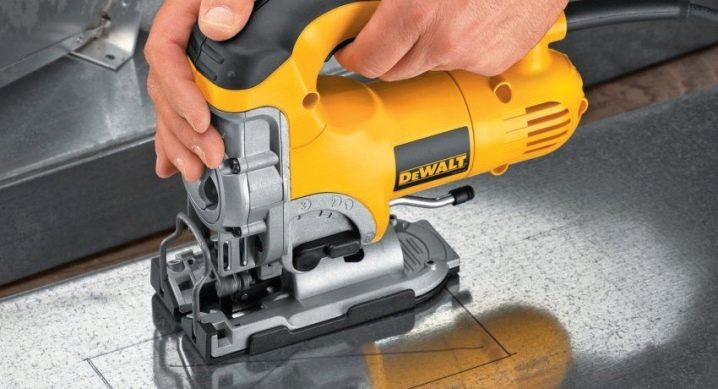
Breakdown prevention
Preventive measures always extend the life of any tool, including jigsaws. At the beginning of work, unscrew the screws, open the case. With the help of alcohol and a cotton cloth, it is necessary to clean all units of old grease. Then a new lubricant is applied to the desired points (in accordance with the recommendations prescribed in the instructions-memo). It is very important to process precisely the dynamic parts of the unit (current, gearbox).
There are also a number of preventive measures:
- using only "native" parts;
- produce canvases by 70 percent and then change them;
- use canvases only those that correspond to the nature of these works;

- during operation, do not "strain" with excessive mechanical loads;
- clean the tool from accumulated dust at least once a week;
- use WD-40 lubricant;
- use a vacuum cleaner for cleaning;
- do not hit or drop the tool - this often leads to damage to the bearing rod;
- do not tighten the file too tightly in the mount;
- for too dense materials, there are special devices, they must be used;
- each material has its own optimal operating mode (speed, angle of inclination, etc.);
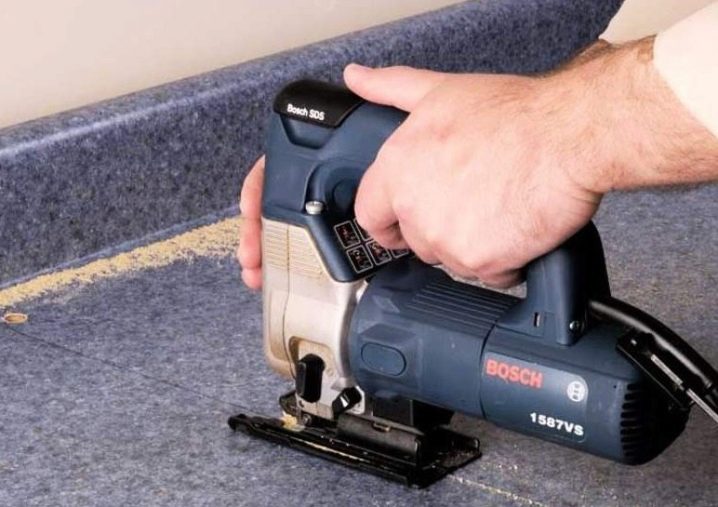
- the base of the support roller should be treated with special technical grease at least once a week;
- you should actively use technical brushes to process the tool after finishing work;
- always monitor the ventilation grill of the instrument and clean it from mechanical microparticles.
How to repair a jigsaw with your own hands, you will learn from the video below.













The comment was sent successfully.